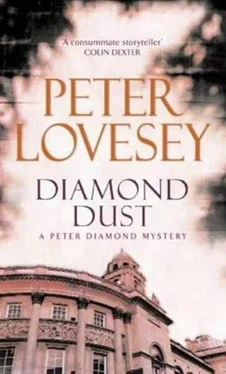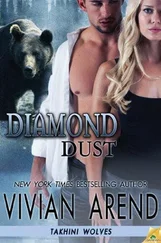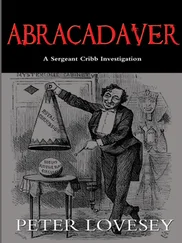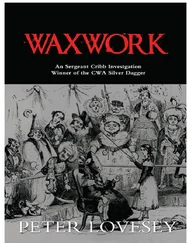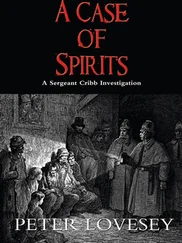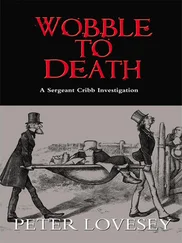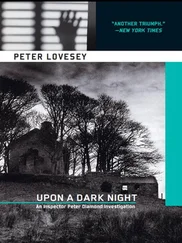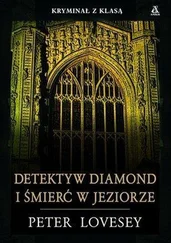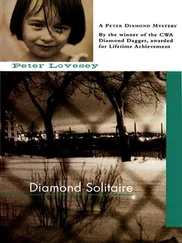So he still faced the sickening possibility that Steph had been murdered with the gun he had stupidly kept all those years. How the killer had found it, he could only guess. He had two hypotheses, equally painful to accept. Firstly, it was possible Steph had discovered the gun herself and instead of asking him what the hell he was doing with it she had confided in someone she mistakenly believed she could trust – this T'. Theory number two: she had trusted; someone, some Trojan Horse, so well that he was given the run of the house and went up into the loft and found the gun. It seemed fantastic, but a fantastic crime required a fantastic explanation.
He bought a burger and a beer and sat in his usual seat below the west front of the Abbey where the mediaeval stone angels scarred and mutilated by five hundred years of weather clung resolutely to their ladders. Watching them at the edge of his vision he sometimes caught them on the move. He'd fix his gaze on the left side, and the angels on the right would climb up a rung or two, always upwards. He knew it was impossible and an optical illusion, but it lifted his own spirits when it happened.
The events of the last twenty-four hours were being manipulated by the police to make him break faith with Steph. Uncomfortable facts had to be faced. What other construction was there to put on the entries she'd made in the diary than that she was meeting somebody she'd never mentioned to him? None he could think of. Fair enough, she was his wife, not his ten-year-old daughter, and she had a perfect right to meet people without telling him every detail. She didn't demand to know how he spent every hour of each day. Yet it wasn't in Steph's nature to have secrets from him. She was open about everything. She would enjoy telling him how she'd spent each day and he'd looked forward every evening to hearing her lively slant on the things she'd done and the contacts she'd made. This had been one of the strengths of their marriage. Nothing had been off-limits.
Nothing except…
He sat forward and his hand went to his face. There was a part of her life they scarcely ever mentioned. Her first marriage, a time of such unhappiness that it never lost the power to hurt.
Her dipstick ex-husband, who hadn't bothered to turn up to the funeral, nor even leave a message that he regretted her cruel death, had been called Edward. That was the name she'd used on the rare occasions she spoke of him. Edward. The formality distanced him from her.
Edward Dixon-Bligh.
What a mouthful.
Surely when she lived with him she would have called him Ted.
His eyes travelled up the Abbey front. One of those angels had just moved.
That evening he repeatedly tried the London number he believed was Dixon-Bligh's and kept getting the same answerphone message: a plummy voice asking the caller to leave a name and number and 'I'll get back to you toot-sweet' It grated after the third or fourth try, especially as the message didn't supply a name. Never having met the man, he couldn't tell for certain if the voice belonged to Steph's ex.
He left a message saying it was extremely important that they spoke, however late.
But in this case, 'toot-sweet' meant 'not tonight'.
Lying awake waiting for the call that didn't come, he tried to think of a reason why that pig of a husband might have resurfaced in Steph's life. The most plausible was that he'd run through his money and appealed to her for funds. She'd always been a soft touch, helping scatty friends who couldn't pay the phone bill and were threatened with disconnection. She sometimes bought the same Big Issue three times over to help homeless people. It wouldn't have required much of a sob story from Dixon-Bligh to have her reaching for her chequebook. She hadn't forgotten the misery of life with him, but she'd still fork out.
Even Steph, generous as she was, must have sensed that it wasn't a good idea to meet her ex-husband. She would have preferred dealing with him by phone and post. Most likely he concocted some reason for meeting her in the park. It had been written in her diary, so it was fixed ahead of time. Maybe he'd offered to hand over something that belonged to her.
Surely he wasn't blackmailing her?
Blackmail?
At night, a tired brain can dredge up dark thoughts, and Diamond's years in the police had given him plenty of practice. Was it possible Dixon-Bligh had evidence -letters, photos, press clippings – touching on some part of Steph's early life she had wanted to forget? Some youthful indiscretion? A drugs episode? Drunk-driving? A relationship with some notorious character? No, it wasn't about covering up old scars. It had to be more damaging. Could she have committed some criminal act that had gone undetected?
Come off it, he told himself. This isn't Steph you're thinking about. She was no more of a saint than any other spirited woman, but she wasn't into crime.
He turned over and looked at the clock. One-fifteen.
Then he sat up and switched on the light. This had to be thought through. If he was dealing with anyone else but Steph, he'd put blackmail top of the list. It was a classic set-up: the no-good ex-husband worming back into her life and threatening to tell all. He'd offer to hand over the evidence in return for cash. She'd agree to meet him on neutral ground. The diary appeared to confirm it.
Then what?
My God, he thought, as the scenario flashed up in his brain. She had armed herself. She must have gone up to the loft one ill-starred day and found that sodding gun. When Dixon-Bligh resurfaced in her life making threats and demanding money she'd taken it with her to meet him in the park. Most likely she had no thought of killing him. She'd meant to produce the gun and demand the return of whatever he was using as the basis of blackmail. That much was consistent with Steph's character. She had a streak of defiance and was as fearless as a tigress.
She had taken the gun with her, but she had no experience of handling it. Dixon-Bligh had grabbed it and shot her. If charged, he would offer that well-tried defence: there was a struggle and the gun went off.
But right now, he'd be thinking he'd got away with it. He'd have judged, correctly, that Steph wouldn't have mentioned the blackmail to anyone else. He wouldn't know about the diary entries.
Certain he wouldn't get to sleep for hours now, Diamond got up and pulled on the clothes he'd dropped in a heap in the corner a couple of hours before. He needed physical activity. Fresh air.
Fresh it was. A sharp east wind was blowing up Weston High Street, shifting the discarded packs and paper cups outside the takeaway. He pulled up the collar of his overcoat and jammed his old trilby more tightly over his bald patch. The occasional car passed him, but no one else was desperate enough to be walking the streets.
It was painful, this process of speculating on the bits of Steph's life she may have wanted to keep from him. It was alien to their relationship. She had known the worst about him and taken him on with all his faults, and he'd always told her everything. No, he thought, that isn't true. Who am I kidding? I kept things back. I didn't tell her I kept the gun all those years, mainly because I knew she'd hate to have such a thing in the house. And if I wasn't open with Steph, and she found out, she was entided to feel let down. Was it any wonder she kept quiet about what happened after she found it?
Those diary entries hurt him, just as she must have been hurt when she found the gun. You work at your marriage, trusting, believing, and the more honest the relationship is, the more devastating is any deceit. The people we love the most are capable of inflicting the greatest pain.
Still, if there were ugly things in her past, he couldn't ignore them. He might feel guilty probing, but he'd sworn over her dead body he would find her killer. That outweighed everything.
Читать дальше
